人教版(2019)必修一 unit4 Natural disasters重点句型讲析 课件(17张)
文档属性
| 名称 | 人教版(2019)必修一 unit4 Natural disasters重点句型讲析 课件(17张) | 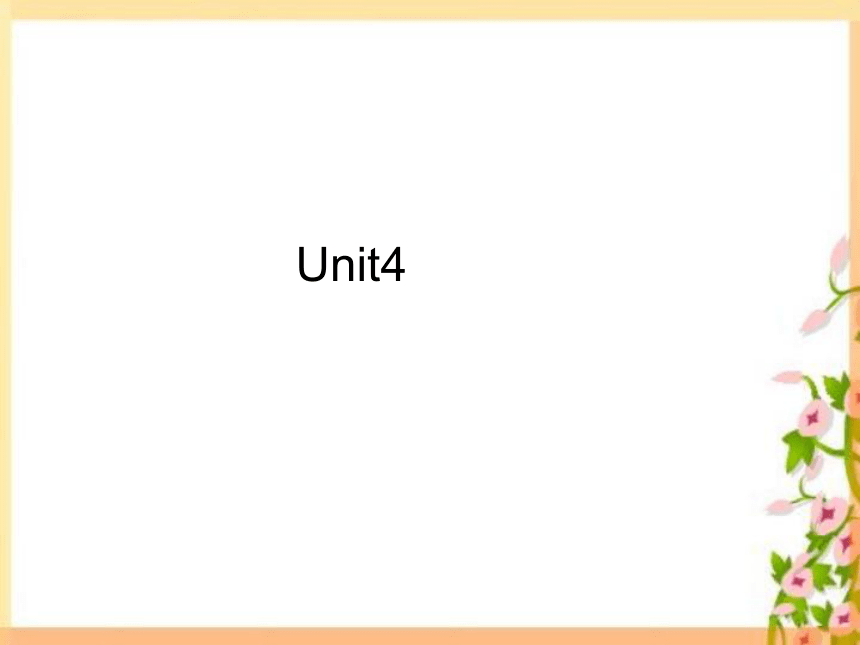 | |
| 格式 | pptx | ||
| 文件大小 | 89.8KB | ||
| 资源类型 | 教案 | ||
| 版本资源 | 人教版(2019) | ||
| 科目 | 英语 | ||
| 更新时间 | 2021-08-26 17:39:48 | ||
图片预览

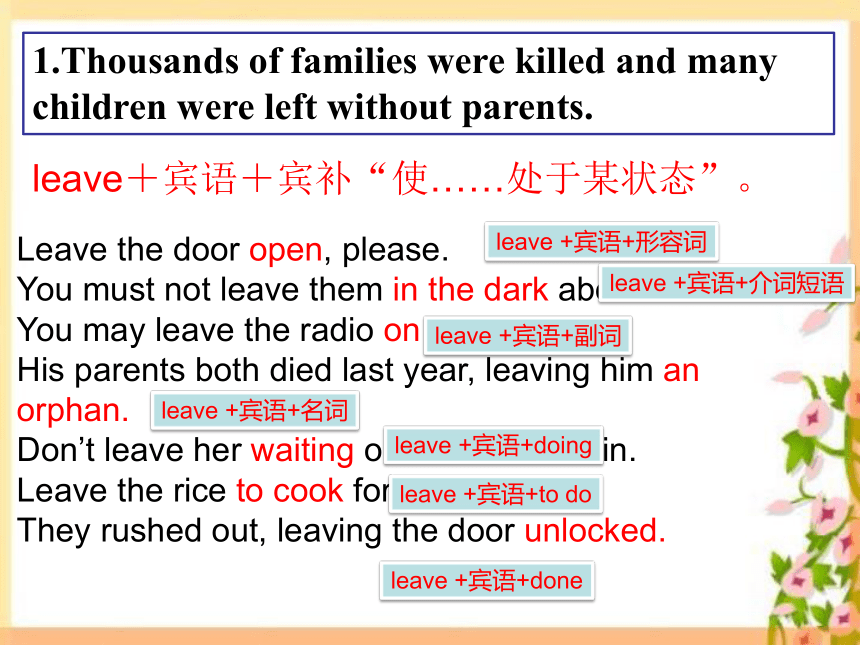
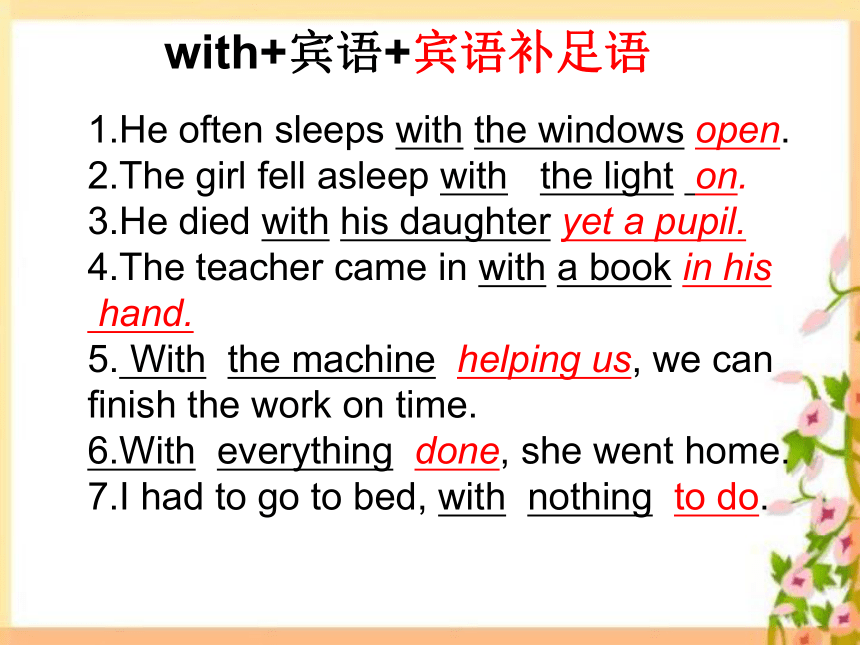
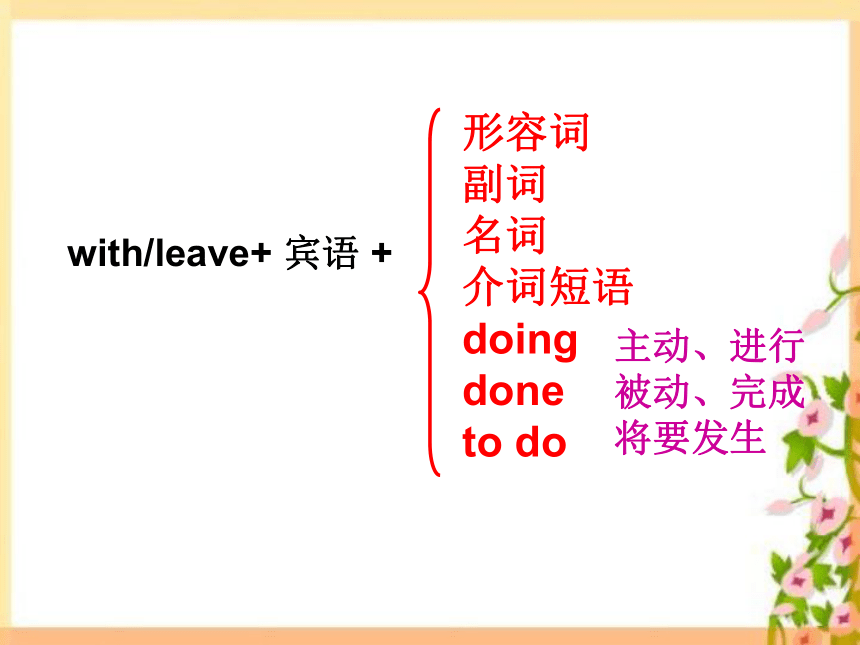
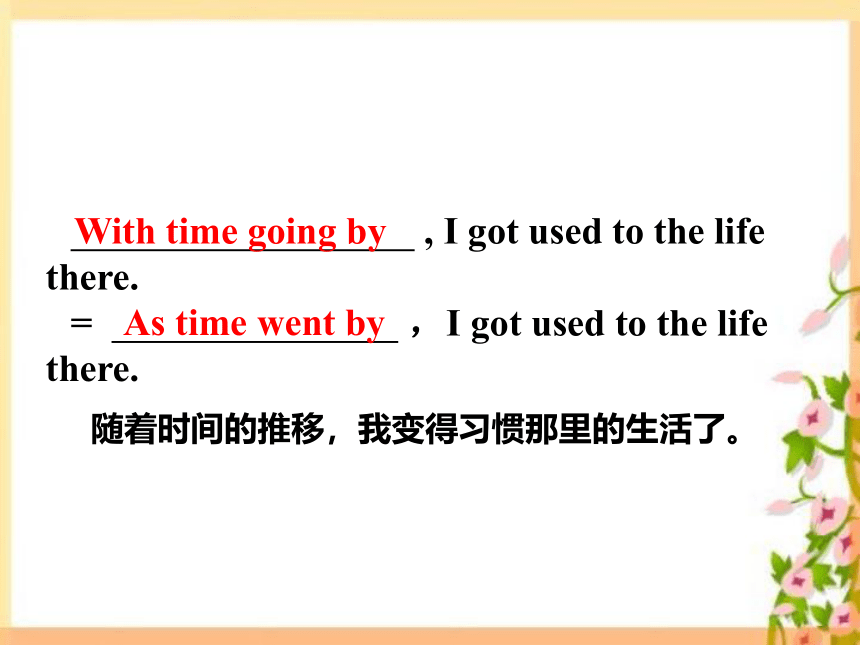
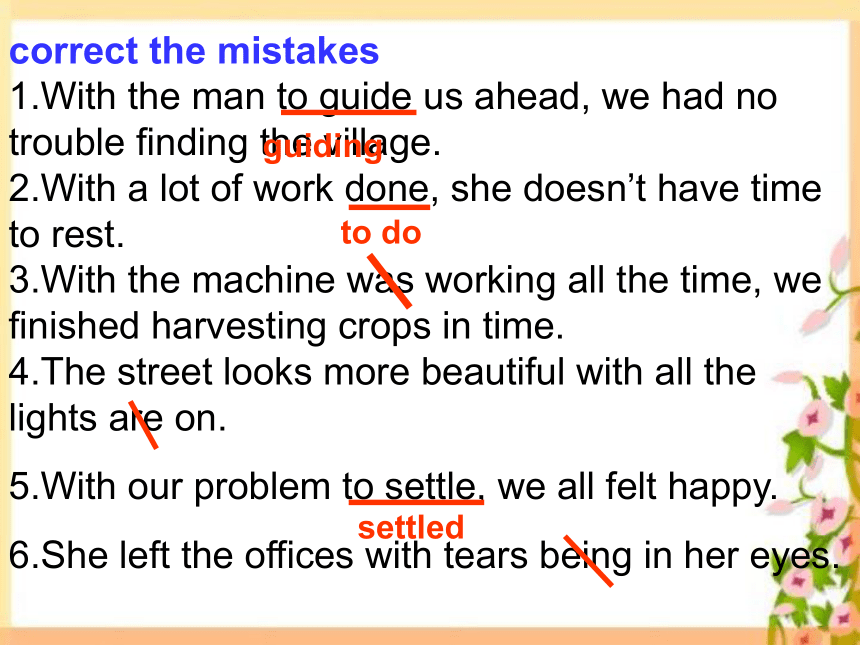
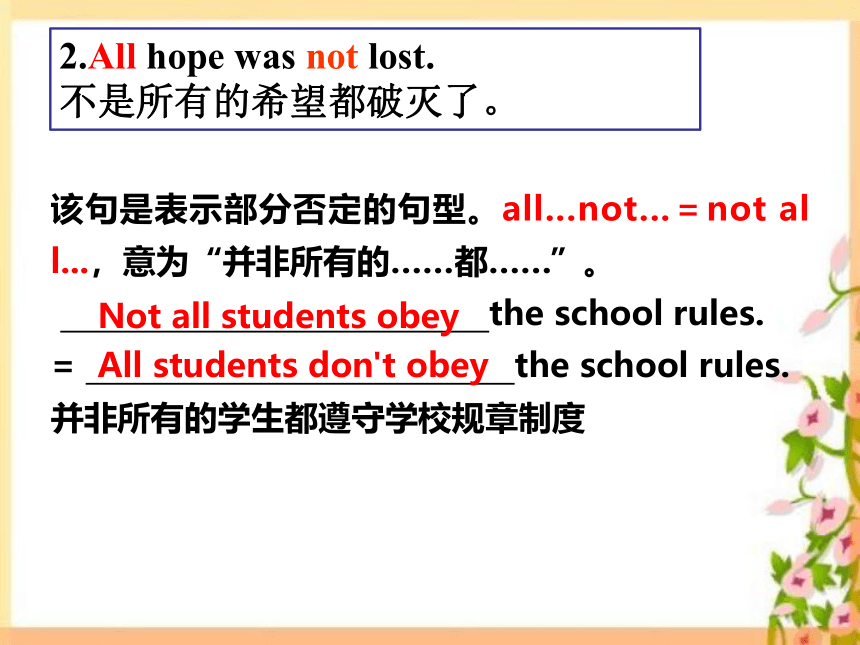
文档简介
(共17张PPT)
Unit4
1.Thousands
of
families
were
killed
and
many
children
were
left
without
parents.
leave+宾语+宾补“使……处于某状态”。
Leave
the
door
open,
please.
You
must
not
leave
them
in
the
dark
about
it
.
You
may
leave
the
radio
on
.
His?parents?both?died?last?year,?leaving?him?an
orphan.
Don’t
leave
her
waiting
outside
in
the
rain.
Leave
the
rice
to
cook
for
20
minutes.
They
rushed
out,
leaving
the
door
unlocked.
leave
+宾语+形容词
leave
+宾语+介词短语
leave
+宾语+副词
leave
+宾语+名词
leave
+宾语+doing
leave
+宾语+to
do
leave
+宾语+done
with+宾语+宾语补足语
1.He
often
sleeps
with
the
windows
open.
2.The
girl
fell
asleep
with
the
light
on.
3.He
died
with
his
daughter
yet
a
pupil.
4.The
teacher
came
in
with
a
book
in
his
hand.
5.
With
the
machine
helping
us,
we
can
finish
the
work
on
time.
6.With
everything
done,
she
went
home.
7.I
had
to
go
to
bed,
with
nothing
to
do.
with/leave+
宾语
+
形容词
副词
名词
介词短语
doing
done
to
do
主动、进行
被动、完成
将要发生
随着时间的推移,我变得习惯那里的生活了。
,
I
got
used
to
the
life
there.
=
,I
got
used
to
the
life
there.
As
time
went
by
With
time
going
by
correct
the
mistakes
1.With
the
man
to
guide
us
ahead,
we
had
no
trouble
finding
the
village.
2.With
a
lot
of
work
done,
she
doesn’t
have
time
to
rest.
3.With
the
machine
was
working
all
the
time,
we
finished
harvesting
crops
in
time.
4.The
street
looks
more
beautiful
with
all
the
lights
are
on.
5.With
our
problem
to
settle,
we
all
felt
happy.
6.She
left
the
offices
with
tears
being
in
her
eyes.
guiding
to
do
settled
该句是表示部分否定的句型。all...not...=not
all...,意为“并非所有的……都……”。
the
school
rules.
=
the
school
rules.
并非所有的学生都遵守学校规章制度
Not
all
students
obey
All
students
don't
obey
2.All
hope
was
not
lost.
不是所有的希望都破灭了。
归纳拓展
(1)英语中的all,both,each,every,
everybody,
everything,completely,always,whole,entirely等具有总括意义的代词、形容词和副词与否定词not连用,无论not位置如何,均构成部分否定,表示“并非都”的意思。
(2)英语中的no,none,never,
nobody,
nothing,neither,
no
one,nowhere,no
more,等表否定意义的词(组)与肯定式谓语一起使用构成“全部否定”。
Nobody
agreed
with
my
opinion.
句型转换
1.All
my
friends
do
not
study
well.
→________________________________(同义句)
→________________________________(改为全部否定)
Not
all
my
friends
study
well.
None
of
my
friends
study
well.
1.be
doing
...
when
...
正在做......这时突然......
2.be
about
to
do...
when...
正要做......这时突然......
3.had
just
done
...when
...
刚做完某事,这时突然......
3.The
man
was
sleeping
downstairs
when
the
earthquake
happened.
(
1
)
We
when
it
began
to
rain.
我们正要出发,就在这时开始下雨了。
(
2
)
He
when
someone
knocked
at
the
door.
他正在做作业,就在这时有人敲门。
(
3
)
We
when
the
bell
rang.
我们刚刚入睡,就在这时铃声响了起来。
were
about
to
start
had
just
fallen
asleep
was
doing
his
homework
4.In
the
farmyards,
the
chickens
and
even
the
pigs
were
too
nervous
to
eat.
too...
to
“太……而不能……(表否定)”
可转化为
not...enough
to...和
so...that...。
这孩子太小,不能够自己穿衣。
The
child
is
too
young
to
dress
himself.
The
child
is
not
old
enough
to
dress
himself.
The
child
is
so
young
that
he
can't
dress
himself.
The
book
is
too
easy
to
understand.
1)
too
前面含有表示否定意义的词,如:
not,
never,
nothing等时,too...
to...
结构表示肯定意义。
It
is
never
too
old
to
learn.
2)在too...
to...这种结构的前面出现了only,
加强了too的肯定语气,only
too
相当于very
或very
much。
I
shall
be
only
too
pleased
to
get
home.
3.
too后接表示感情的形容词,如glad,
pleased,
happy,
sad等时,too...
to...句型表示的是肯定意义
He
is
too
sad
to
hear
the
bad
news.
(1)与事实一致;或极有可能发生
陈述语气
It
looks
as
though
it
is
going
to
rain.
5.It
seemed
as
if
the
world
was
at
an
end!
2)与不事实一致;或极少有可能发生
虚拟语气
He
talks/talked/is
talking/was
talking
about
the
USA
as
if
he
had
been
there
before.
先于主句动作发生
The
stick
is
put
into
water
as
if
it
were
broken
与主句动作同时发生
He
was
so
happy
as
if
he
would
/could
land
on
the
moon
at
once
后于主句动作发生
did
/were
had
done
would/could+do
3.He
acts
as
if
he__________
to
the
moon
tomorrow.(go)
2.They
talked
as
if
they
_________
friends
for
years.(be)
1.She
loves
the
baby
as
if
it
______her
own
son.(be)
were
had
been
would/could
go
如果as
if引导的从句中的主语和主句的主语相同,且含有be动词,可省略从句主语和be动词.
He
opened
his
mouth
as
if(he
was)
to
say
something.
Unit4
1.Thousands
of
families
were
killed
and
many
children
were
left
without
parents.
leave+宾语+宾补“使……处于某状态”。
Leave
the
door
open,
please.
You
must
not
leave
them
in
the
dark
about
it
.
You
may
leave
the
radio
on
.
His?parents?both?died?last?year,?leaving?him?an
orphan.
Don’t
leave
her
waiting
outside
in
the
rain.
Leave
the
rice
to
cook
for
20
minutes.
They
rushed
out,
leaving
the
door
unlocked.
leave
+宾语+形容词
leave
+宾语+介词短语
leave
+宾语+副词
leave
+宾语+名词
leave
+宾语+doing
leave
+宾语+to
do
leave
+宾语+done
with+宾语+宾语补足语
1.He
often
sleeps
with
the
windows
open.
2.The
girl
fell
asleep
with
the
light
on.
3.He
died
with
his
daughter
yet
a
pupil.
4.The
teacher
came
in
with
a
book
in
his
hand.
5.
With
the
machine
helping
us,
we
can
finish
the
work
on
time.
6.With
everything
done,
she
went
home.
7.I
had
to
go
to
bed,
with
nothing
to
do.
with/leave+
宾语
+
形容词
副词
名词
介词短语
doing
done
to
do
主动、进行
被动、完成
将要发生
随着时间的推移,我变得习惯那里的生活了。
,
I
got
used
to
the
life
there.
=
,I
got
used
to
the
life
there.
As
time
went
by
With
time
going
by
correct
the
mistakes
1.With
the
man
to
guide
us
ahead,
we
had
no
trouble
finding
the
village.
2.With
a
lot
of
work
done,
she
doesn’t
have
time
to
rest.
3.With
the
machine
was
working
all
the
time,
we
finished
harvesting
crops
in
time.
4.The
street
looks
more
beautiful
with
all
the
lights
are
on.
5.With
our
problem
to
settle,
we
all
felt
happy.
6.She
left
the
offices
with
tears
being
in
her
eyes.
guiding
to
do
settled
该句是表示部分否定的句型。all...not...=not
all...,意为“并非所有的……都……”。
the
school
rules.
=
the
school
rules.
并非所有的学生都遵守学校规章制度
Not
all
students
obey
All
students
don't
obey
2.All
hope
was
not
lost.
不是所有的希望都破灭了。
归纳拓展
(1)英语中的all,both,each,every,
everybody,
everything,completely,always,whole,entirely等具有总括意义的代词、形容词和副词与否定词not连用,无论not位置如何,均构成部分否定,表示“并非都”的意思。
(2)英语中的no,none,never,
nobody,
nothing,neither,
no
one,nowhere,no
more,等表否定意义的词(组)与肯定式谓语一起使用构成“全部否定”。
Nobody
agreed
with
my
opinion.
句型转换
1.All
my
friends
do
not
study
well.
→________________________________(同义句)
→________________________________(改为全部否定)
Not
all
my
friends
study
well.
None
of
my
friends
study
well.
1.be
doing
...
when
...
正在做......这时突然......
2.be
about
to
do...
when...
正要做......这时突然......
3.had
just
done
...when
...
刚做完某事,这时突然......
3.The
man
was
sleeping
downstairs
when
the
earthquake
happened.
(
1
)
We
when
it
began
to
rain.
我们正要出发,就在这时开始下雨了。
(
2
)
He
when
someone
knocked
at
the
door.
他正在做作业,就在这时有人敲门。
(
3
)
We
when
the
bell
rang.
我们刚刚入睡,就在这时铃声响了起来。
were
about
to
start
had
just
fallen
asleep
was
doing
his
homework
4.In
the
farmyards,
the
chickens
and
even
the
pigs
were
too
nervous
to
eat.
too...
to
“太……而不能……(表否定)”
可转化为
not...enough
to...和
so...that...。
这孩子太小,不能够自己穿衣。
The
child
is
too
young
to
dress
himself.
The
child
is
not
old
enough
to
dress
himself.
The
child
is
so
young
that
he
can't
dress
himself.
The
book
is
too
easy
to
understand.
1)
too
前面含有表示否定意义的词,如:
not,
never,
nothing等时,too...
to...
结构表示肯定意义。
It
is
never
too
old
to
learn.
2)在too...
to...这种结构的前面出现了only,
加强了too的肯定语气,only
too
相当于very
或very
much。
I
shall
be
only
too
pleased
to
get
home.
3.
too后接表示感情的形容词,如glad,
pleased,
happy,
sad等时,too...
to...句型表示的是肯定意义
He
is
too
sad
to
hear
the
bad
news.
(1)与事实一致;或极有可能发生
陈述语气
It
looks
as
though
it
is
going
to
rain.
5.It
seemed
as
if
the
world
was
at
an
end!
2)与不事实一致;或极少有可能发生
虚拟语气
He
talks/talked/is
talking/was
talking
about
the
USA
as
if
he
had
been
there
before.
先于主句动作发生
The
stick
is
put
into
water
as
if
it
were
broken
与主句动作同时发生
He
was
so
happy
as
if
he
would
/could
land
on
the
moon
at
once
后于主句动作发生
did
/were
had
done
would/could+do
3.He
acts
as
if
he__________
to
the
moon
tomorrow.(go)
2.They
talked
as
if
they
_________
friends
for
years.(be)
1.She
loves
the
baby
as
if
it
______her
own
son.(be)
were
had
been
would/could
go
如果as
if引导的从句中的主语和主句的主语相同,且含有be动词,可省略从句主语和be动词.
He
opened
his
mouth
as
if(he
was)
to
say
something.
